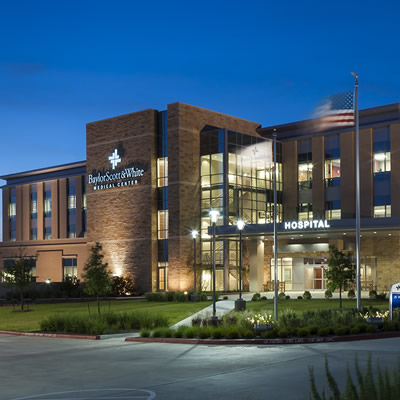Regain your mobility with expert hip care
Healthy hips make an active life possible, but hip injuries can slow you down at work, home and in pursuit of your goals and favorite pastimes. You don’t need to accept hip pain as part of your future. At orthopedic specialty centers across North and Central Texas, you’ll find Baylor Scott & White orthopedic experts ready to help you, using nonsurgical treatments whenever possible and advanced procedures when needed.
When seeking to solve a stubborn problem like hip pain, it’s nice to have several potential solutions to choose from. That’s why our team offers a wide range of treatments for hip injuries. Our orthopedic surgeons take the time to gain a deep understanding of your injury and goals so they can recommend the treatments that best fit your needs.
Our approach to hip care
You can trust that your journey through diagnosis and treatment will be personalized to you. After a thorough diagnostic evaluation, our experts will design a treatment plan that’s unique to your condition, lifestyle and goals for care. Oftentimes, imaging such as X-rays, CT scans and MRI scans may be needed.
Your plan will likely start with nonsurgical treatments, which may be all you need to manage hip pain and get back to the activities that matter most to you. If those treatments aren’t successful, you’ll have access to many types of hip surgery, including minimally invasive procedures with small incisions that can help you return to your regular activities faster.
-
Commitment to conservative care
Our goal is to find the least invasive treatment that will be effective for your hip pain. As a result, your treatment will start conservatively and progress to less conservative options as needed.
Fortunately, our orthopedic surgeons have a large toolkit of nonsurgical treatments to use. Your physician may recommend a program of rest, ice, compression and elevation that you can follow at home, as well as exercises to strengthen muscles around your hip. For pain relief, your physician may prescribe over-the-counter or prescription medications or selective injections into the joint.
Physical therapy offers another potential solution for hip injuries. Our physical therapists can teach you exercises you can perform at home to boost your hip’s strength and range of motion long after therapy ends.
-
Precision surgeries
Not all hip injuries respond to nonsurgical treatments. If your symptoms continue after trying conservative therapies, surgery may be the best next step. At Baylor Scott & White, you’ll find a skilled team of orthopedic surgeons offering the full range of hip procedures, from hip arthroscopy, open hip preservation procedures and decompression, to advanced cartilage transplantation and joint reconstruction and replacement surgeries.
Our surgeons use the latest techniques and technologies to maximize precision and minimize surgery’s impact on you. Whenever possible, we operate using minimally invasive techniques that produce little scarring and shorten hospital stays and recovery times. We offer minimally invasive total hip replacement and hip reconstruction procedures. In some cases, our surgeons use robotic technology to help plan or perform procedures, which allows them to be precise in complex hip surgeries.
-
Care that’s tailored to you
When you seek care for a hip injury, you likely have a specific goal in mind. It might be getting back to hiking, being able to kick a soccer ball around with your child again or simply not hurting when you walk to the mailbox. From your orthopedic surgeon to your nurses and physical therapists, everyone on your Baylor Scott & White care team will work together to help you achieve your goal.
Our team’s job is to find what works for you—not just a treatment that will relieve symptoms, but also one that will help you enjoy the quality of life you want. To do that, we’ll get to know you so we can personalize your care. Together, we’ll discuss your treatment options and help you choose what makes sense for you.
-
Support at every step
No matter what your journey with hip care entails, you won’t walk the path alone. If you need hip replacement surgery, your team will help prepare you for success. This process starts before surgery. You’ll attend a class to learn how to prepare yourself and your home for surgery and what to expect from the procedure. After surgery, you’ll follow a personalized rehabilitation plan to help you rebuild strength and functional abilities so you can get back to an active life.
Hip conditions we treat
Your hip is a ball-and-socket joint made up of bones, muscles, tendons, ligaments and cartilage. Injuries can affect any part of this complex joint. You can find care for a range of hip injuries and conditions from Baylor Scott & White orthopedic surgeons. Some of the most common hip conditions our team cares for include:
- Acetabular labral tear
- Arthritis
- Avascular necrosis (osteonecrosis)
- Bone infections (osteomyelitis)
- Bursitis
- Chondrolysis of the hip
- Congenital hip disorders
- Degenerative joint disease (osteoarthritis)
- Developmental dysplasia of the hip
- Femoroacetabular (hip) impingement
- Fractures and dislocations
- Greater trochanteric pain syndrome
- Hip cartilage injuries
- Hip dysplasia
- Hip malrotation
- Chronic pain
- Labral tear
- Perthes disease
- Slipped capital femoral epiphysis (SCFE)
- Snapping hip syndrome
- Sub-spine impingement
- Sprains
- Synovitis
- Tendonitis
Our hip treatments and procedures
Our orthopedic specialists will work with you to find the best treatment for your hip pain, tailored to your age, lifestyle and health. Your plan may include care from experts in areas like rehabilitation, sports medicine or rheumatology, all focused on relieving your pain and getting you moving again.
For mild or manageable pain, lifestyle changes and nonsurgical treatments may offer relief. Depending on the type and severity of your symptoms, your provider may recommend one or more of the following options:
- Arthroscopy
- Abductor reconstruction
- Complex hip revision
- Hip cartilage transplantation
- Hip decompression
- Hip replacement
- Hip resurfacing
- Hip preservation
- Labral reconstruction
- Minimally invasive hip surgery
- Periacetabular osteotomy (PAO)
- Femoral osteotomy (FO)
- Surgical hip dislocation (Ganz Dislocation)
- Physical therapy
- Platelet-rich plasma therapy
- Viscosupplementation
Ease in every step
Liz Sigman shares her hip replacement experience and how she healed with confidence.
Find a location near you
We help you get care at a location that fits your needs. We offer several locations for your care, including orthopedic specialty centers in North and Central Texas.

Baylor Scott & White Orthopaedic Trauma Associates - McKinney
5220 W University Dr POB II, Ste 220, McKinney, TX, 75071
- Monday: 8:00 am - 4:30 pm
- Tuesday: 8:00 am - 4:30 pm
- Wednesday: 8:00 am - 4:30 pm
- Thursday: 8:00 am - 4:30 pm
- Friday: 8:00 am - 2:00 pm

Baylor Scott & White Orthopedic Associates of Dallas - McKinney
5220 W University Dr POB II, Ste 300, McKinney, TX, 75071
- Monday: 8:00 am - 5:00 pm
- Tuesday: 8:00 am - 5:00 pm
- Wednesday: 8:00 am - 5:00 pm
- Thursday: 8:00 am - 5:00 pm
- Friday: 8:00 am - 5:00 pm

Baylor Scott & White Hip Preservation Center - McKinney
5220 W University Dr Ste 220, McKinney, TX, 75071
- Monday: 8:00 am - 4:00 pm
- Tuesday: 8:00 am - 4:00 pm
- Wednesday: 8:00 am - 4:00 pm
- Thursday: 8:00 am - 4:00 pm
- Friday: 8:00 am - 12:00 pm

Baylor Scott & White Medical Center - McKinney
5252 W University Dr Highway 380 at Lake Forest Drive, McKinney, TX, 75071
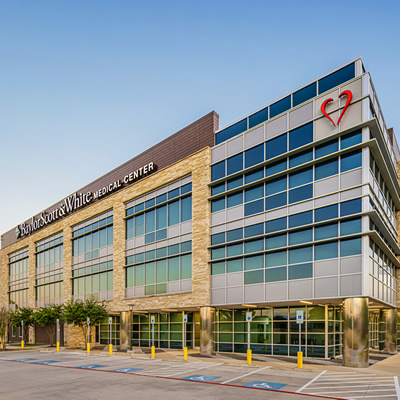
Baylor Scott & White Medical Center - Lake Pointe
6800 Scenic Dr , Rowlett, TX, 75088
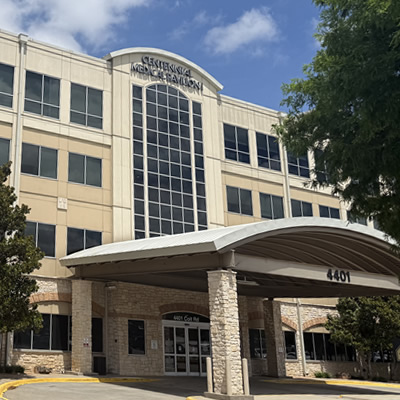
Baylor Scott & White Orthopedic Associates of Dallas - Centennial
4401 Coit Rd Ste 203, Frisco, TX, 75035
- Monday: 8:00 am - 5:00 pm
- Tuesday: 8:00 am - 5:00 pm
- Wednesday: 8:00 am - 5:00 pm
- Thursday: 8:00 am - 5:00 pm
- Friday: 8:00 am - 4:00 pm
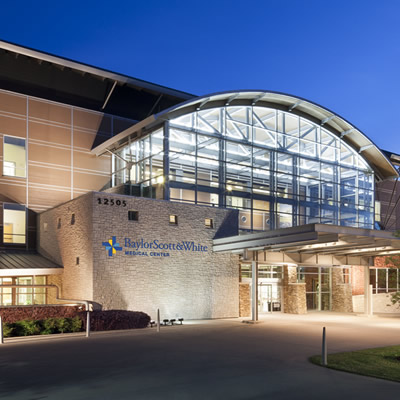
Baylor Scott & White Medical Center - Centennial
12505 Lebanon Rd , Frisco, TX, 75035
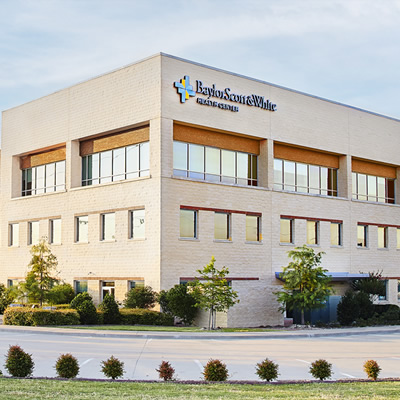
Baylor Scott & White Orthopedic Associates of Dallas - North Garland
7217 Telecom Pkwy Ste 325, Garland, TX, 75044

Baylor Scott & White Orthopedic Associates of Dallas at The Star
3800 Gaylord Pkwy Ste 810, Frisco, TX, 75034
- Monday: 8:00 am - 5:00 pm
- Tuesday: 8:00 am - 5:00 pm
- Wednesday: 8:00 am - 5:00 pm
- Thursday: 8:00 am - 5:00 pm
- Friday: 8:00 am - 5:00 pm

Baylor Scott & White Sports Surgery Center at The Star
3800 Gaylord Pkwy Ste 410, Frisco, TX, 75034
- Monday: 6:00 am - 5:00 pm
- Tuesday: 6:00 am - 5:00 pm
- Wednesday: 6:00 am - 5:00 pm
- Thursday: 6:00 am - 5:00 pm
- Friday: 6:00 am - 5:00 pm
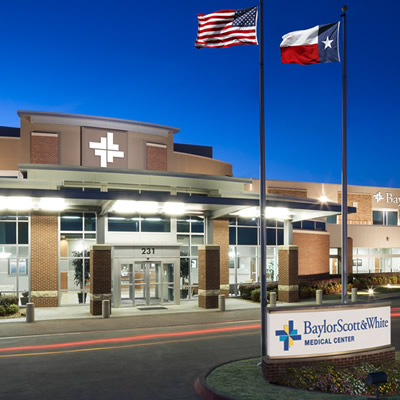
Baylor Scott & White Medical Center - Sunnyvale
231 S Collins Rd , Sunnyvale, TX, 75182

Baylor Scott & White Orthopedic Associates of Dallas - Sunnyvale
341 Wheatfield Dr Ste 290, Sunnyvale, TX, 75182

Baylor Scott & White Orthopedic Associates of Dallas - Plano
4716 Alliance Blvd Pavilion II, Ste 600, Plano, TX, 75093
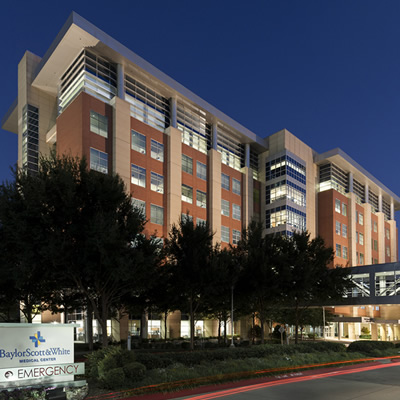
Baylor Scott & White Medical Center - Plano
4700 Alliance Blvd , Plano, TX, 75093
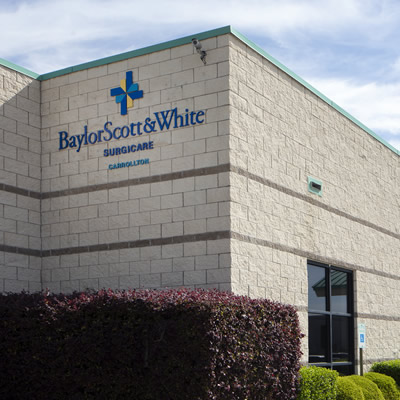
Baylor Scott & White Surgicare - Carrollton
4780 N Josey Ln , Carrollton, TX, 75010
- Monday: 6:00 am - 5:00 pm
- Tuesday: 6:00 am - 5:00 pm
- Wednesday: 6:00 am - 5:00 pm
- Thursday: 6:00 am - 5:00 pm
- Friday: 6:00 am - 5:00 pm

Baylor Scott & White Orthopedic Associates of Dallas - Park Cities
9101 N Central Expy Ste 370, Dallas, TX, 75231

Baylor Scott & White Orthopedic Associates of Dallas
3900 Junius St Ste 500, Dallas, TX, 75246
- Monday: 8:00 am - 5:00 pm
- Tuesday: 8:00 am - 5:00 pm
- Wednesday: 8:00 am - 5:00 pm
- Thursday: 8:00 am - 5:00 pm
- Friday: 8:00 am - 5:00 pm

Baylor University Medical Center, part of Baylor Scott & White Health
3500 Gaston Ave , Dallas, TX, 75246

Baylor Scott & White Orthopaedic Trauma Associates - Dallas
3409 Worth St Ste 300, Dallas, TX, 75246
- Monday: 8:00 am - 4:30 pm
- Tuesday: 8:00 am - 4:30 pm
- Wednesday: 8:00 am - 4:30 pm
- Thursday: 8:00 am - 4:30 pm
- Friday: 8:00 am - 2:00 pm
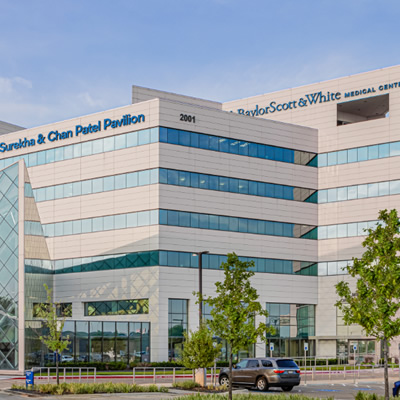
Baylor Scott & White Greater Dallas Orthopaedics - Irving
2001 N MacArthur Blvd Ste 630, Irving, TX, 75061

Baylor Scott & White Medical Center - Grapevine
1650 W College St , Grapevine, TX, 76051
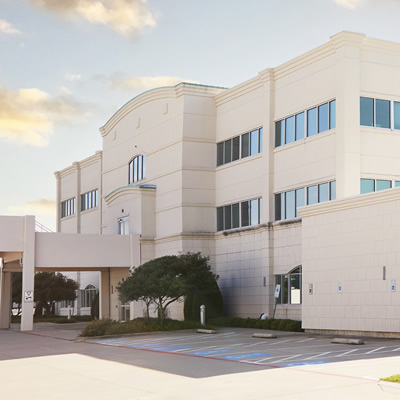
Baylor Scott & White Orthopaedic Trauma Associates - Grapevine
1631 Lancaster Dr Ste 230, Grapevine, TX, 76051
- Monday: 8:00 am - 4:30 pm
- Tuesday: 8:00 am - 4:30 pm
- Wednesday: 8:00 am - 4:30 pm
- Thursday: 8:00 am - 4:30 pm
- Friday: 8:00 am - 2:00 pm
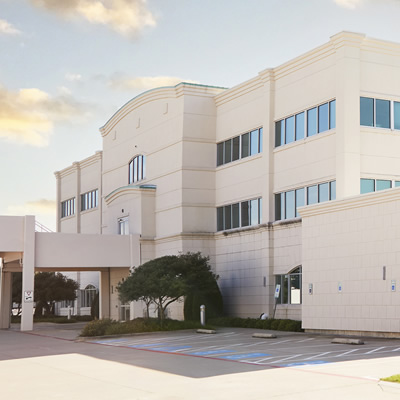
Baylor Scott & White Orthopedic Associates of Dallas - Grapevine
1631 Lancaster Dr Ste 230, Grapevine, TX, 76051
- Monday: 8:00 am - 5:00 pm
- Tuesday: 8:00 am - 5:00 pm
- Wednesday: 8:00 am - 5:00 pm
- Thursday: 8:00 am - 5:00 pm
- Friday: 8:00 am - 5:00 pm
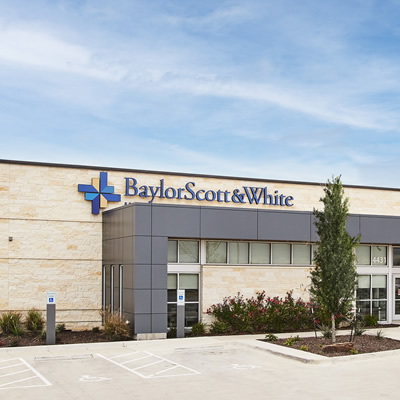
Baylor Scott & White Sports Medicine and Orthopedic Institute - Midway Midlothian
4431 E US Hwy 287 , Midlothian, TX, 76065
- Monday: 8:00 am - 4:30 pm
- Tuesday: 8:00 am - 4:30 pm
- Wednesday: 8:00 am - 4:30 pm
- Thursday: 8:00 am - 4:30 pm
- Friday: 8:00 am - 4:30 pm

Baylor Scott & White Sports Medicine and Orthopedic Institute - Mansfield
1776 N US 287 Ste 220, Mansfield, TX, 76063
- Monday: 8:00 am - 4:30 pm
- Tuesday: 8:00 am - 4:30 pm
- Wednesday: 8:00 am - 4:30 pm
- Thursday: 8:00 am - 4:30 pm
- Friday: 8:00 am - 4:30 pm
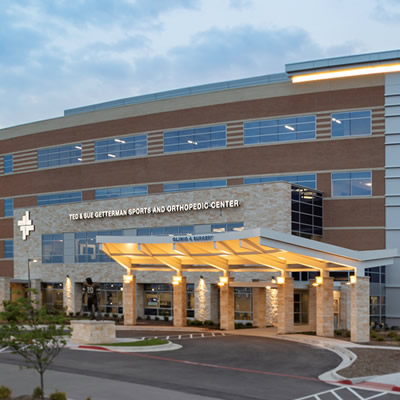
Baylor Scott & White Sports and Orthopedic Center
140 Hillcrest Medical Blvd , Waco, TX, 76712
- Monday: 8:00 am - 5:00 pm
- Tuesday: 8:00 am - 5:00 pm
- Wednesday: 8:00 am - 5:00 pm
- Thursday: 8:00 am - 5:00 pm
- Friday: 8:00 am - 5:00 pm

Baylor Scott & White Medical Center - Hillcrest
100 Hillcrest Medical Blvd , Waco, TX, 76712
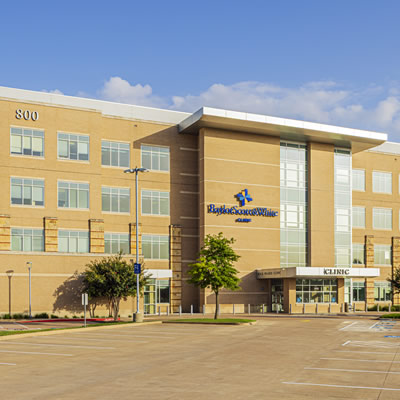
Baylor Scott & White Clinic - College Station Rock Prairie
800 Scott and White Dr , College Station, TX, 77845
- Monday: 7:30 am - 5:00 pm
- Tuesday: 7:30 am - 5:00 pm
- Wednesday: 7:30 am - 5:00 pm
- Thursday: 7:30 am - 5:00 pm
- Friday: 7:30 am - 5:00 pm

Baylor Scott & White Medical Center - College Station
700 Scott and White Dr , College Station, TX, 77845
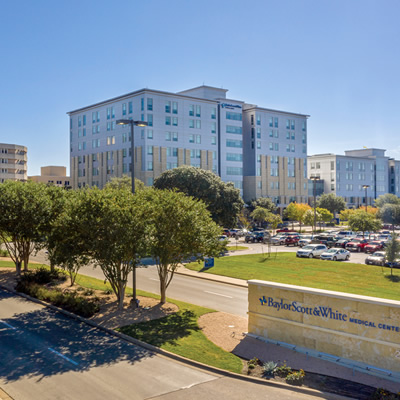
Baylor Scott & White Medical Center - Temple
2401 S 31st St , Temple, TX, 76508
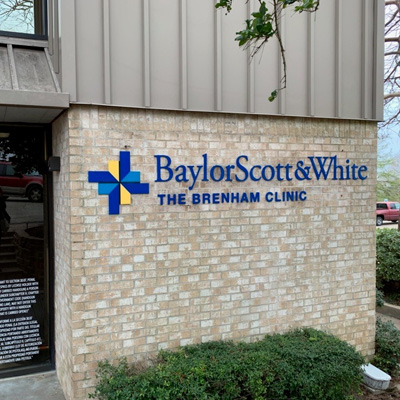
Baylor Scott & White - The Brenham Clinic
600 N Park St , Brenham, TX, 77833
- Monday: 7:30 am - 5:00 pm
- Tuesday: 7:30 am - 5:00 pm
- Wednesday: 7:30 am - 5:00 pm
- Thursday: 7:30 am - 5:00 pm
- Friday: 7:30 am - 5:00 pm
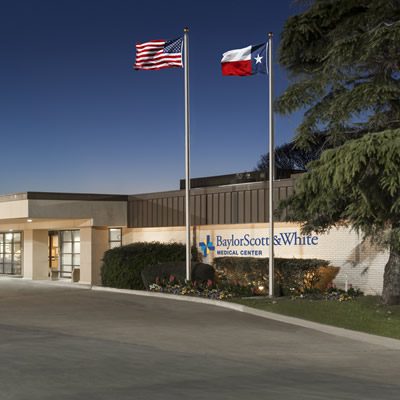
Baylor Scott & White Medical Center - Brenham
700 Medical Pkwy , Brenham, TX, 77833
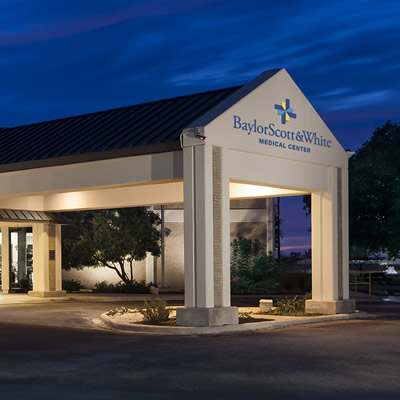
Baylor Scott & White Medical Center - Taylor
305 Mallard Ln , Taylor, TX, 76574
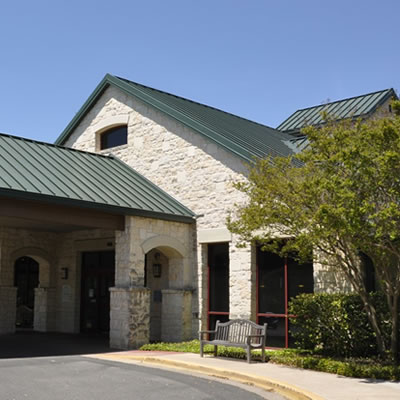
Baylor Scott & White Clinic - Georgetown
4945 Williams Dr , Georgetown, TX, 78633
- Monday: 7:30 am - 5:00 pm
- Tuesday: 7:30 am - 5:00 pm
- Wednesday: 7:30 am - 5:00 pm
- Thursday: 7:30 am - 5:00 pm
- Friday: 7:30 am - 5:00 pm
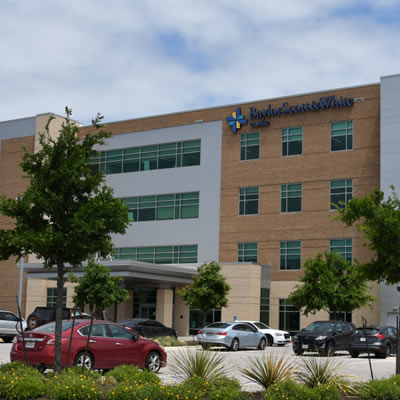
Baylor Scott & White Clinic - Round Rock 300 University
300A University Blvd , Round Rock, TX, 78665
- Monday: 8:00 am - 5:00 pm
- Tuesday: 8:00 am - 5:00 pm
- Wednesday: 8:00 am - 5:00 pm
- Thursday: 8:00 am - 5:00 pm
- Friday: 8:00 am - 5:00 pm

Baylor Scott & White Medical Center - Round Rock
300 University Blvd , Round Rock, TX, 78665
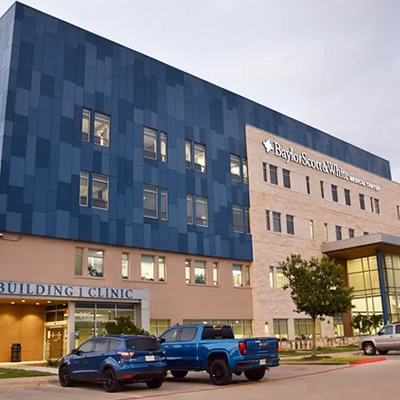
Baylor Scott & White Medical Center - Pflugerville (Building 1)
2600 E Pflugerville Pkwy Bldg 1, Ste 100, Pflugerville, TX, 78660
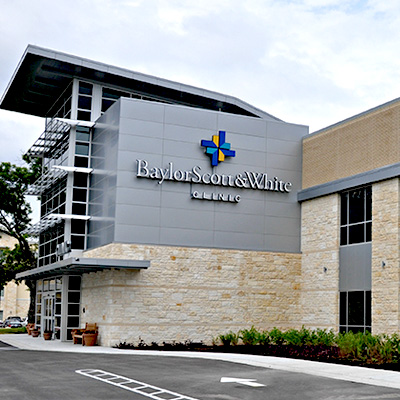
Baylor Scott & White Clinic - Cedar Park
910 E Whitestone Blvd , Cedar Park, TX, 78613
- Monday: 8:00 am - 5:00 pm
- Tuesday: 8:00 am - 5:00 pm
- Wednesday: 8:00 am - 5:00 pm
- Thursday: 8:00 am - 5:00 pm
- Friday: 8:00 am - 5:00 pm
- Monday: 7:00 am - 5:00 pm
- Tuesday: 7:00 am - 5:00 pm
- Wednesday: 7:00 am - 5:00 pm
- Thursday: 7:00 am - 5:00 pm
- Friday: 7:00 am - 5:00 pm
- Saturday: 9:00 am - 2:00 pm
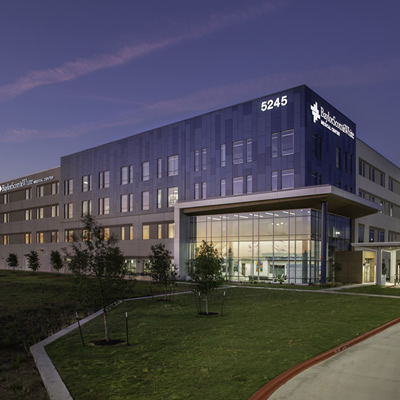
Baylor Scott & White Medical Center - Austin
5245 W US Hwy 290 Service Rd , Austin, TX, 78735

Baylor Scott & White Medical Center - Lakeway
100 Medical Pkwy , Lakeway, TX, 78738
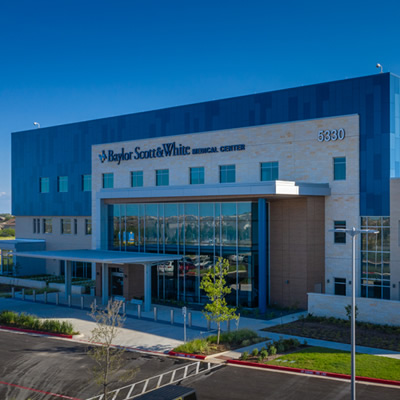
Baylor Scott & White Medical Center - Buda
5330 Overpass Rd , Buda, TX, 78610
